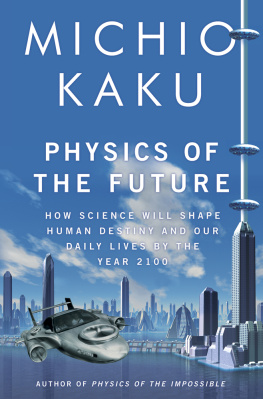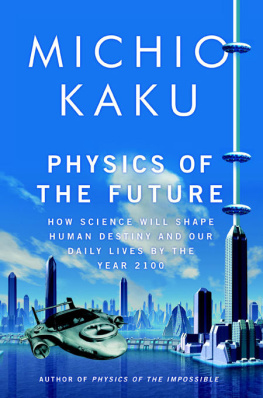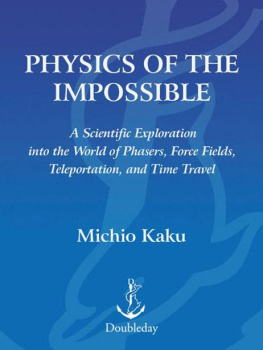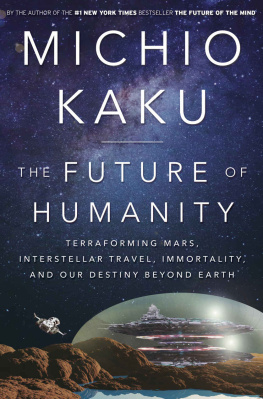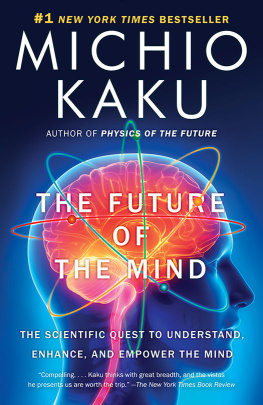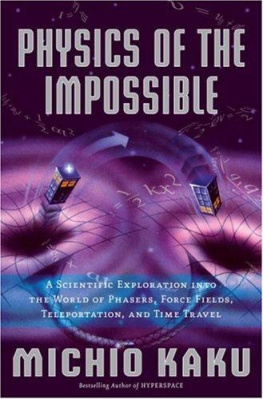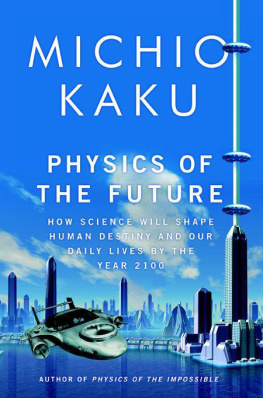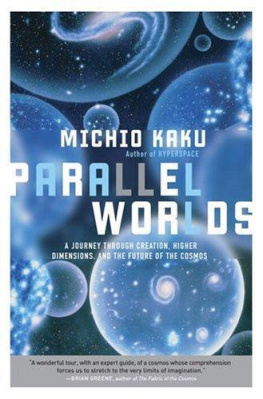DR.MICHIO KAKU
PROFESSOR OF THEORETICAL PHYSICS
CITY UNIVERSITY OF NEW YORK
PHYSICS OF THE FUTURE
HOW SCIENCE WILL SHAPE HUMAN DESTINY AND OUR DAILY LIVES BY THE YEAR 2100
ALLEN LANE
an imprint of
PENGUIN BOOKS
ALLEN LANE
Published by the Penguin Group
Penguin Books Ltd, 80 Strand, London WC2R 0RL , England
Penguin Group (USA) Inc., 375 Hudson Street, New York, New York 10014, USA
Penguin Group (Canada), 90 Eglinton Avenue East, Suite 700, Toronto, Ontario, Canada M4P 2Y3
(a division of Pearson Penguin Canada Inc.)
Penguin Ireland, 25 St Stephens Green, Dublin 2, Ireland (a division of Penguin Books Ltd)
Penguin Group (Australia), 250 Camberwell Road, Camberwell, Victoria 3124, Australia
(a division of Pearson Australia Group Pty Ltd)
Penguin Books India Pvt Ltd, 11 Community Centre, Panchsheel Park, New Delhi 110 017, India
Penguin Group (NZ), 67 Apollo Drive, Rosedale, Auckland 0632, New Zealand
(a division of Pearson New Zealand Ltd)
Penguin Books (South Africa) (Pty) Ltd, 24 Sturdee Avenue, Rosebank, Johannesburg 2196, South Africa
Penguin Books Ltd, Registered Offices: 80 Strand, London WC2R 0RL , England
www.penguin.com
First published in the United States by Doubleday, a division of Random House, Inc., New York 2011
First published in Great Britain by Allen Lane 2011
Copyright Michio Kaku, 2011
All rights reserved
Except in the United States of America, this book is sold subject to the condition that it shall not, by way of trade or otherwise, be lent, re-sold, hired out, or otherwise circulated without the publishers prior consent in any form of binding or cover other than that in which it is published and without a similar condition including this condition being imposed on the subsequent purchaser
ISBN: 978-0-14-193139-5
To my loving wife, Shizue,
and my daughters, Michelle and Alyson
ACKNOWLEDGMENTS
I would like to thank those individuals who have worked tirelessly to make this book a success. First, I would like to thank my editors, Roger Scholl, who guided so many of my previous books and came up with the idea for a challenging book like this, and also Edward Kastenmeier, who has patiently made countless suggestions and revisions to this book that have greatly strengthened and enhanced its presentation. I would also like to thank Stuart Krichevsky, my agent for so many years, who has always encouraged me to take on newer and more exciting challenges.
And, of course, I would like to thank the more than three hundred scientists I interviewed or had discussions with concerning science. I would like to apologize for dragging a TV camera crew from BBC- TV or the Discovery and Science channels into their laboratories and thrusting a microphone and TV camera in front of their faces. This might have disrupted their research, but I hope that the final product was worth it.
I would like to thank some of these pioneers and trailblazers:
Eric Chivian, Nobel laureate, Center for Health and the Global Environment, Harvard Medical School
Peter Doherty, Nobel laureate, St. Jude Childrens Research Hospital
Gerald Edelman, Nobel laureate, Scripps Research Institute
Murray Gell-Mann, Nobel laureate, Santa Fe Institute and Caltech
Walter Gilbert, Nobel laureate, Harvard University
David Gross, Nobel laureate, Kavli Institute for Theoretical Physics
the late Henry Kendall, Nobel laureate, MIT
Leon Lederman, Nobel laureate, Illinois Institute of Technology
Yoichiro Nambu, Nobel laureate, University of Chicago
Henry Pollack, Nobel laureate, University of Michigan
Joseph Rotblat, Nobel laureate, St. Bartholomews Hospital
Steven Weinberg, Nobel laureate, University of Texas at Austin
Frank Wilczek, Nobel laureate, MIT
Amir Aczel, author of Uranium Wars
Buzz Aldrin, former NASA astronaut, second man to walk on the moon
Geoff Andersen, research associate, United States Air Force Academy, author of The Telescope
Jay Barbree, NBC news correspondent, coauthor of Moon Shot
John Barrow, physicist, University of Cambridge, author of Impossibility
Marcia Bartusiak, author of Einsteins Unfinished Symphony
Jim Bell, professor of astronomy, Cornell University
Jeffrey Bennet, author of Beyond UFOs
Bob Berman, astronomer, author of Secrets of the Night Sky
Leslie Biesecker, chief of Genetic Disease Research Branch, National Institutes of Health
Piers Bizony, science writer, author of How to Build Your Own Spaceship
Michael Blaese, former National Institutes of Health scientist
Alex Boese, founder of Museum of Hoaxes
Nick Bostrom, transhumanist, University of Oxford
Lt. Col. Robert Bowman, Institute for Space and Security Studies
Lawrence Brody, chief of the Genome Technology Branch, National Institutes of Health
Rodney Brooks, former director, MIT Artificial Intelligence Laboratory
Lester Brown, founder of Earth Policy Institute
Michael Brown, professor of astronomy, Caltech
James Canton, founder of Institute for Global Futures, author of The Extreme Future
Arthur Caplan, director, Center for Bioethics, University of Pennsylvania
Fritjof Capra, author of The Science of Leonardo
Sean Carroll, cosmologist, Caltech
Andrew Chaikin, author of A Man on the Moon
Leroy Chiao, former NASA astronaut
George Church, director, Center for Computational Genetics, Harvard Medical School
Thomas Cochran, physicist, Natural Resources Defense Council
Christopher Cokinos, science writer, author of The Fallen Sky
Francis Collins, director of the National Institutes of Health
Vicki Colvin, director of Biological and Environmental Nanotechnology, Rice University
Neil Comins, author of The Hazards of Space Travel
Steve Cook, director of Space Technologies, Dynetics, former NASA spokesperson
Christine Cosgrove, author of Normal at Any Cost
Steve Cousins, president and CEO, Willow Garage
Brian Cox, physicist, University of Manchester, BBC science host
Phillip Coyle, former assistant secretary of defense, U.S. Defense Department
Daniel Crevier, author of AI: The Tumultuous History of the Search for Artificial Intelligence, CEO of Coreco
Ken Croswell, astronomer, author of Magnificent Universe
Steven Cummer, computer science, Duke University
Mark Cutkosky, mechanical engineering, Stanford University
Paul Davies, physicist, author of Superforce
Aubrey de Gray, Chief Science Officer, SENS Foundation
the late Michael Dertouzos, former director, Laboratory for Computer Science, MIT
Jared Diamond, Pulitzer Prize winner, professor of geography, UCLA
Mariette DiChristina, editor in chief, Scientific American
Peter Dilworth, former MIT AI Lab scientist
John Donoghue, creator of BrainGate, Brown University
Ann Druyan, widow of Carl Sagan, Cosmos Studios
Freeman Dyson, emeritus professor of physics, Institute for Advanced Study, Princeton
Jonathan Ellis, physicist, CERN
Daniel Fairbanks, author of Relics of Eden
Timothy Ferris, emeritus professor at the University of California, Berkeley, author of Coming of Age in the Milky Way
Maria Finitzo, filmmaker, Peabody Award winner, Mapping Stem Cell Research

